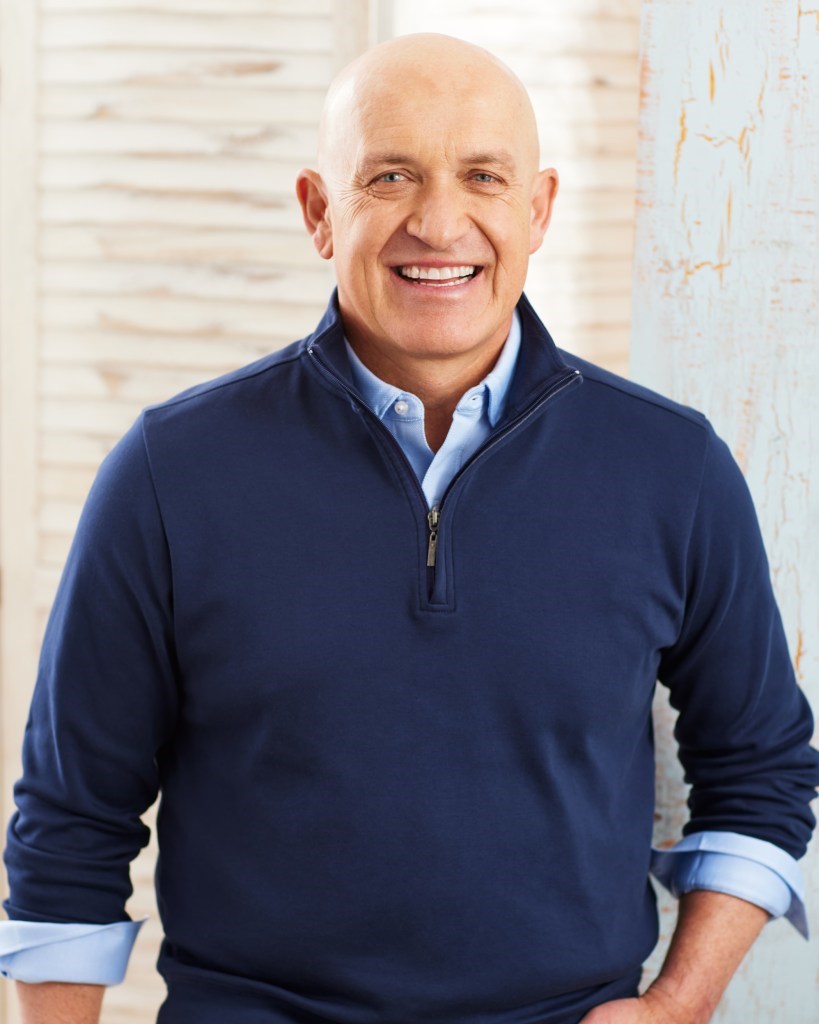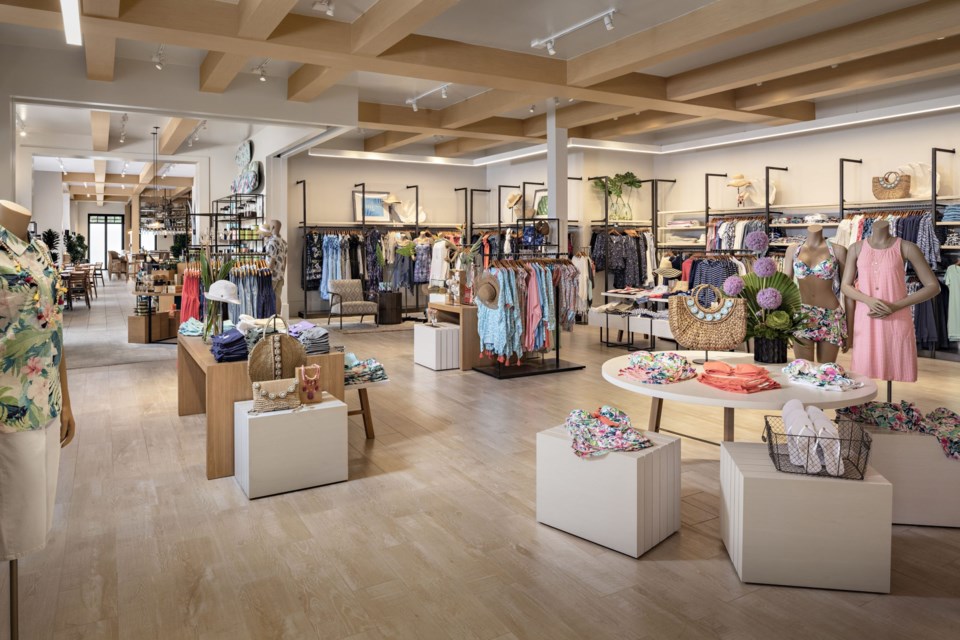It was a great concept: turn a fictional good-life-livin' beach bum into an island-inspired clothing brand. But Tommy Bahama didn't stop there. The successful clothing brand rolled out its own fragrance and furniture lines as well as 22 restaurants and bars with more to open this year — and if you've ever been to the Legacy West location, you know their food and drinks are very, very good. But when so many other brands expand and come up short, why does Tommy Bahama excel?
"I say to people all the time: Tommy Bahama should be a Harvard business case," Tommy Bahama CEO Doug Wood tells Local Profile. "It is a remarkable story of an apparel company that became a lifestyle company."
Tommy Bahama was founded in 1993, meaning that this year marks the brand's 30th anniversary. The now iconic silk camp shirts found a unique whitespace in fashion, and by 1996, when the brand was looking to expand to its first bricks-and-mortar space in Naples, Florida, it was offered a much larger retail space than expected. The founders said, hey, let's start a restaurant.
"I'm telling you, that's like the worst business decision that anyone can make, because if you want to lose money, start a restaurant," says Wood, who has been at Tommy Bahama for 22 years. What might have seemed like a bad business ended up a great one, defining what Tommy Bahama was for decades to come: more than just a clothing company, but rather, a lifestyle one.
"Because of that, today, I have a restaurant company that does over 100 million dollars in restaurant volume per year," says Wood, who credits chef-driven food and well-crafted drinks for the restaurants' success — as well as the brand's decision to create spaces for guests to relax, without Tommy Bahama trying to sell them shirts. And relaxing is exactly what people do. Just swing by the Tommy Bahama in Legacy West: people are out on the patio, eating, drinking and having a great time. "Internally, we talk about our job being to raise the bar. I want to exceed expectations in everything that we do, especially in restaurants," says Wood. "We strive for great food, but also great cocktails. We work very hard to make sure we have bartenders that know exactly what they are doing."

"We are restaurant people," adds Wood. He's right. They are. Tommy Bahama is the only apparel manufacturer to own and operate its restaurants in-house, as a division of the company. "It really has differentiated us from other brands who are like, we should try to get into the restaurant business to try to sell stuff — that's not what we do," says Wood. "We are in the hospitality business. That has allowed us to become a real lifestyle brand." Excelling in the notoriously-difficult restaurant industry parlayed into the ability to expand and succeed in other ventures, like furniture. To date, for example, Tommy Bahama has sold over 25 million beach chairs — selling an average of 2 million a year at Costco alone.
"At our very core, we are an island-inspired brand," says Wood. "And that island is a state of mind. We talk about this all the time: Why, as an island-inspired brand, go to Legacy West and deliver a great brand experience in the middle of North Texas?" For Wood and his team, the location is an oasis. "It's not about rushing, it's about slowing down, kicking off your shoes and enjoying your life," he says. "At the end of the day, we are trying to inspire you to relax. That is at the core of every decision we make."
Tommy Bahama is part of a publicly-traded company. As CEO, Wood's job is to grow the company and make money. But, that doesn't mean Tommy Bahama chases after any offer. Every decision is put through a filter. "When we are talking about a new product launch or a new licensing opportunity, we are always asking where the sand is," he says. If something is off-brand or "too shiny," they pass. "We make all decisions through this very tight filter," says Wood. "And it really comes from that we know we stand for something. It's difficult because there are things we always want to chase. But there are lots of cautionary tales where great brands have tried to become something else — and they lost their position."
That doesn't mean that Tommy Bahama is averse to growth and change — on the contrary. Tommy Bahama, the brand, has expanded from Thirty percent of the men's line is now tech wear like performance pants. "However," says Wood, "if you want a beautiful camp shirt, I am always going to have it for you."

Later this year, Tommy Bahama is making its biggest expansion yet: its first branded resort. Tommy Bahama is teaming up with Lowe, a hospitality real estate investor and operator and developer of hotel and resort properties, for the Tommy Bahama Miramonte Resort & Spa in Indian Wells, California. The 35,000-square-foot resort will have 215 custom-appointed rooms, including 23 suites, three resort-style pools and a 12,000-square-foot spa.
For years, the idea of a Tommy Bahama resort was floated. But if running a clothing brand is hard and running restaurants is harder, then running a resort is even harder. For a lifestyle company, it's expert mode. "This is a huge opportunity to keep elevating the brand," says Wood. "At the same time, just like with restaurants, you better not screw it up, but if somebody buys a shirt and a button pops off, they will probably forgive us. If you go to one of my restaurants, and you get food poisoning, you are never coming back." That, explains Wood, is a risk to the brand. "But if I screw up your vacation? God help us. It's the most precious time of your life. We are keenly aware of what's riding on this, so we are really throwing everything at it to come up with a unique Tommy Bahama experience." For Tommy Bahama, this is an opportunity to raise the bar and excel even more.
"When you come to our website, I know you're going to stay for six or seven minutes, bouncing around our website," says Wood. "If you visit our retail store, you're probably going to stay for fifteen minutes. If you come to our restaurant, you're going to spend an hour and a half. But the idea of coming to a resort and spending three to five to seven days in our Tommy Bahama resort, from a brand experience standpoint, is really the ultimate." Other lifestyle brands have hotels — but they're typically one-offs. "I expect to have a second hotel — and a third hotel," says Wood. "Whenever you do something new, if the first one isn't great, you don't get to have a second one."
"When guests walk in there, they are going to understand that this is special because I want another one," adds Wood. "This is a business we think we are going to be really good at." We look forward to the first Tommy Bahama resort later this year — and, if they're as good as the experiences at the stores, restaurants and bars, the inevitable second and third ones.




